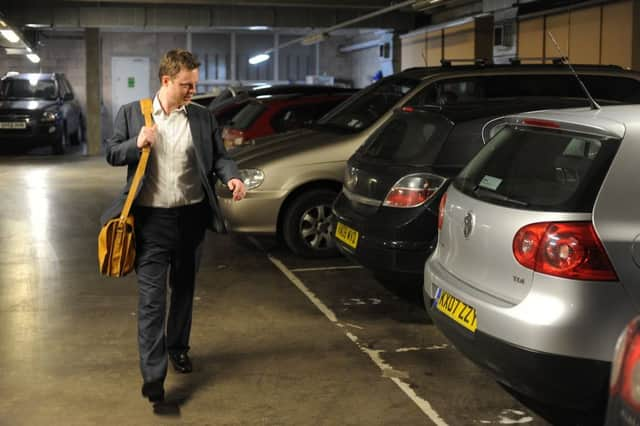Alastair Dalton: Charging to park at work could stage a comeback


Years before congestion charging in Edinburgh was debated and abandoned, an alternative curb on cars was rejected by MSPs – charging for office parking spaces.
It has been virtually forgotten in Scotland since the Labour-Liberal Democrat coalition ditched its plans in 2000, claiming they had no support.
Advertisement
Hide AdAdvertisement
Hide AdWell, it could be back. Seven years ago, Nottingham introduced the UK’s first scheme, under which businesses with more than 11 parking spaces are charged a workplace parking levy.
This has raised millions of pounds to help fund public transport improvements, such as extending the city’s tram network.
North of the Border, the scheme is quietly slipping back onto the agenda.
Transport minister Humza Yousaf told a fringe meeting at this week’s SNP conference that not only were increasing numbers of local authorities expressing interest, but his officials were in touch with Nottingham. Transport Scotland declined to tell me more.
As Professor David Begg, the publisher of Transport Times, who hosted the meeting, pointed out, the key thing about free workplace parking is that staff who are offered it, use it.
One of the biggest headaches for drivers in urban areas is where to park your car, so if that problem is solved, why wouldn’t you?
That certainly seems to be the case with large and prominent office car parks, yards from railway stations in Glasgow city centre.
Commuters are largely creatures of habit, none more so than motorists for whom the process is simple compared to the perceived complexities and uncertainties of public transport, such as the largely user-unfriendly way bus travel is organised.
Advertisement
Hide AdAdvertisement
Hide AdScottish politicians are now bolder than they have been for a decade over taking on the motoring lobby.
Anna Richardson, the SNP-run Glasgow City Council’s sustainability and carbon reduction convener, put it starkly at the meeting. “The hard political truth is we need fewer cars,” she said. “I do not think we have got any choice.”
Glasgow is already a pioneer in one approach to this, in being confirmed this week as Scotland’s first low emission zone, from next year.
At some point after that, only vehicles with the cleanest engines will be allowed into the city centre.
Although the council may only be talking about restrictions on buses so far, but cars will be included eventually.
A workplace parking levy could become another line of attack, because if companies are insistent their staff should be free to drive to work, it is argued they should pay for the congestion these vehicles are adding to, and in turn help fund alternatives to make cars less attractive.
The chief executive’s Mercedes may have the greenest petrol or diesel engine, but it is still taking up space on the roads.
However, such charges could prove a hard sell, just like 17 years ago.
Advertisement
Hide AdAdvertisement
Hide AdMotoring groups fear such a potentially blunt instrument will take no account of individual incomes or travel habits. The Scottish Retail Consortium has raised fears it might make Scotland “a more expensive place to invest or live”.
But political thinking is shifting on transport priorities in cities. Designing everything around the car – at least as we currently know it – may be turned on its head. The right to drive may soon have soon have a much higher price.